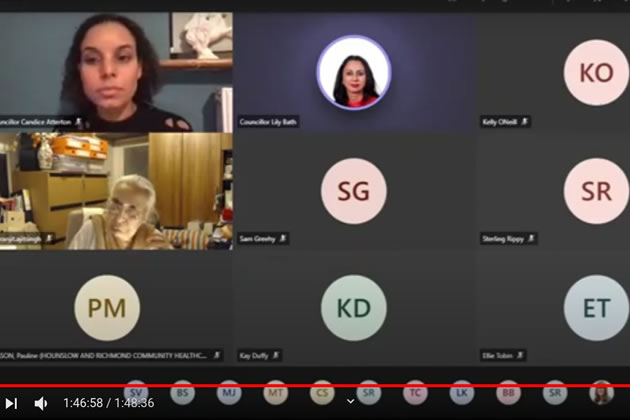Translation Blunders Compromise Council's Covid-19 Efforts
Fears raised that unclear messaging reinforcing health inequalities

Hounslow's Health and Wellbeing Board meeting live streamed on YouTube
Vital coronavirus messaging in different languages to people in Hounslow is feared to not have been effective due to a “mess-up” of translation errors, it has been revealed.
The borough’s Health and Wellbeing Board met on 2 February to discuss the impact of coronavirus on health and wellbeing where it was flagged a series of spelling errors and lack of clarity had been printed in council literature sent out to residents.
Community representative member of the board, Charanjit Ajitsingh, said: “Today I received through my letterbox…the letter about high Covid-19 rates in Hounslow and Heston with lots of translations attached.
“I happen to know and read very well Punjabi and Hindi, and I think it’s a great mess-up, I’m sorry to say those words.
“The translation itself, it’s very, very difficult to read, there are spelling errors, there are grammatical errors, there are things that are not very, very clear.
She added: “What I’m saying is the purpose of informing people in their own language so they can understand what the whole issue is is probably not being delivered.”
Deputy council leader Lily Bath also shared feedback from the comments that another had raised issues with a Polish translation.
The council’s public health team said this is an issue they are aware of and have been trying to resolve. Some translations were stopped from being sent out this week, but the specific letter mentioned had already been distributed.
An officer added: “We recognise that’s an issue we’re having, even though we’ve used about three different translation companies. So we’ve asked our head of communications to go to London communications to get feedback on which companies are actually good, because everything we’ve had, we’ve had the same exact comments on.”
During the meeting, public health officials also relayed to the board findings of health inequalities from the pandemic.
Analysis showed that wards with a higher proportion of residents who did not speak English as their first language had higher rates of coronavirus cases.
Heston, Cranford and Hounslow Central were among the areas flagged within this cohort and it was suggested communication barriers could be an element of this.
Hounslow Central was also ranked the top area in the borough for overcrowding at 36 per cent, and the ward with the highest number of people in multi-generational housing.
Officers said the majority of people living in multi-generational homes were of Asian ethnicity.
Public health director Kelly O’Neill also revealed a comparison of the coronavirus death rates between different ethnic groups in the borough, with data from up to November 30.
By this point, 245 people had died from coronavirus.
Ms O’Neill said: “From the patients with known ethnicity, the highest rate of Covid- 19 deaths were seen in Asians, with a rate of 96.8 per 100,000…
“Our Black community is a much, much smaller community, but again it really features very highly in terms of rate of infection.”
According to the dataset compiled from Office of National Statistics findings, the coronavirus death rate for Black people in the borough was recorded at 76.8 per 100,000.
People of mixed ethnicity showed a rate of 81.7 per 100,000, while the White British group was 72.7 per 100,000.
Ms O’Neill also said the Black community is “very much overrepresented” in data showing the number of premature Covid deaths, which is made up of people under the age of 65 with no previous long-term health conditions.
Black people saw the highest premature Covid death rate at 60 per cent, followed by Asian people at 30 per cent.
Ms O’Neill added: “Work is already going on to address part of that, but as we build up this dataset and when we do get the proper ONS data, that will be able to bring us to where we are about 445 deaths so far across the borough in total.
“We’ll be able to have a much better picture of where we need to target.
“We’re working on this semi dataset, but a semi dataset allows us to start taking those steps forward and start to try and work with communities where we have seen there are significant risk factors.”
Anahita Hossein-Pour - Local Democracy Reporter
February 5, 2021